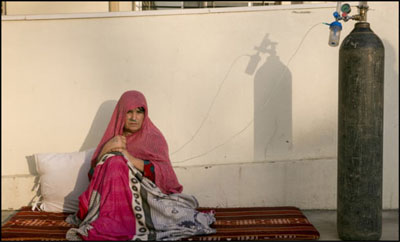Large parts of Afghanistan’s health system are on the brink of collapse because of west-ern sanctions against the Taliban, international experts have warned, as the country faces outbreaks of disease and an escalating malnutrition crisis.
With the country experiencing a deepening humanitarian cri-sis since the Taliban’s seizure of power in August amid mounting levels of famine and economic collapse, many medical staff have not been paid for months and health fa-cilities lack even the most ba-sic items to treat patients.
Dr Paul Spiegel, director of the Center for Humanitarian health at Johns Hopkins Uni-versity, said that on a recent five-week trip to the country he had seen public hospitals – which cater for the most vul-nerable – lacking fuel, drugs, hygiene products and even basic items such as colostomy bags.
He said the Covid-19 respon-sehad almost ground to a halt and called for a more nuanced response to western sanctions in order to avert a deeper pub-lic health disaster.
“It’s really bad and it is going to get a lot worse,” Spiegel, a former chief of public health at the United Nations High Commissioner for Refugees among other high-profile hu-manitarian assignments, told the Guardian.
“There are six simultaneous disease outbreaks: cholera, a massive measles outbreak, polio, malaria and dengue fe-ver, and that is in addition to the coronavirus pandemic.”
Some parts of the primary healthcare system were being funded through a two-decades-old scheme, Spiegel said, but large parts remained largely unsupported, even as health officials, international organisations and NGOs have been required to restart pro-grammes on hold after the Taliban regained control of the country in August.
“I’ve been everywhere during my career. What is shocking is that you don’t normally have an abrupt halt to everything. The UN organisations and NGOs supporting healthcare in Afghanistan are not just dealing with acute emergen-cies, they’re having to re-spond to getting the basics running.
“For example, there are sup-posed to be 39 hospitals deal-ing with Covid-19 cases of which 7.7% is fully function-ing. And it’s not just the hospi-tals. It’s the whole thing that glues together public health systems: surveillance sys-tems, testing and there’s very little oxygen to treat those who do have Covid.”
He described the main referral hospital for infectious dis-eases in Kabul as “on its knees”. “None of the staff have re-ceived salaries for months, though most are still coming in. There is hardly any medi-cine and they are cutting tress in the courtyard to heat the rooms because there is no gas. They’ve also sent their ventilators to the Afghan Ja-pan hospital to treat Covid cases but that is also strug-gling.”
His comments reflected mounting concern over the collapse of healthcare across Afghanistan, a country of 23 million people. Exacerbating the issue is that Afghanistan’s economic issues, with the IMF warning of a contraction of some 30%, have plunged ever more people into poverty, which has had a knock-on ef-fect for those needing health-care but unable to afford to seek it.
Outside of Kabul and other major cities, Spiegel said the situation was even worse. Patients are treated outside a hopsital in Kabul. Photograph: Anadolu Agency/Getty Images
“There is a provincial hospital in Sarobi outside Kabul I vis-ited. There was insufficient water and soap for hygiene protocols,” he said.
“There was a small child who had been born at the hospital with an anal fistula. She was so sick that they had put a colostomy in but they had no bags and so they were using whatever material find – like toilet paper – to collect from the colostomy.”
Dave Michalski, head of pro-gramme at Doctors Without Borders in Afghanistan, last week warned in an interview with NPR that there likely to be Afghans in need of health-care who were not able to ac-cess even the reduced levels available. “How many people are being blocked [from seeking health-care],” he asked. “How many people are not taking the bus to the next province to find healthcare that is working be-cause their own provincial health care system is closed or because there are no drugs on the shelves.
“And if you don’t have the money to travel around to find a private health care facility … and many private health care facilities are also in trouble because of supply lines.” The UN children’s organisa-tion Unicef has warned that the growing crisis in the coun-try’s health system is exacer-bating Afghanistan’s mounting malnutrition issues. “The current humanitarian situation in Afghanistan is dire, especially for children. Winter has already set in and, without additional funding, Unicef and partners will be unable to reach the children and families that need us the most,” said Alice Akunga, Unicef’s Afghanistan repre-sentative.—Agencies










